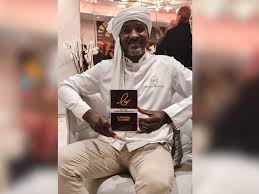Hissein Mahamoud Barkai won France’s Lebey Prize for best artisan in 2022. A member of the Toques françaises association of chefs, he’s become an ambassador for Chadian gastronomy around the world, with hallmark creations like the “Paris-N’Djamena”.
Barkai was born in Chad and after training in France as a pastry chef now spends his time between Paris and N’Djamena.
His cuisine is a delicate fusion of locally sourced ingredients such as dates, almonds and sorghum flour married with French savoir faire.
In October this year he was awarded the 2022 Lebey Prize for best artisan, but earning recognition in his native Chad, where cooking is reserved to women, was a slog.
“Being a Chadian man and cooking is near impossible, even Utopian,” he told RFI’s Nathalie Amar. “I was lucky to live in France and be able to do what I wanted to do, but it’s not easy to be able to cook here in Chad.”
Barkai hails from the north of Chad, where he was born into the Gorane ethnic group.
“In my village of birth only women can cook, so I was touching on a sensitive issue. They’re very welcoming people but they are proud of their traditions and dignity.”
So while Barkai, like many chefs, enjoyed showing off photos of his creations on social media, he used a pseudonym in the early days.
“I was in Montpellier and rather than calling myself Mahamoud, I used Al Hussein. It was close to my real name, but meant that people wouldn’t know straightaway that it was me,” he explains.
After a while he understood he couldn’t spend his life hiding. He made a short video, “a sort of culinary coming out” and posted it on YouTube.
It allowed Barkai to publicly embrace his passion.
“I received countless positive messages from people encouraging me and saying they’d like their son to do the same thing and so on. That’s how the doors opened and it was a psychological relief. A weight had been lifted.”
Feast your eyes on some of Barkai’s creations by clicking on the slideshow below.
Pastries by Hissein Mahamoud Barkai, aka the Desert Pastry Chef
A culinary journey
To the naked eye Barkai’s pastries look like any high-end French patisseries.
“You’d never suspect they’d be part of African or Chadian gastronomy,” he says.
But once you see it on your plate and taste it, “that’s when you start travelling, when you’re in something completely unique: African, Chadian, the land of the Sahel”.
He reels off a few of the many regional ingredients that go into his recipes: balamites, dates, black tamarind, hibiscus, moringa.
One of his specialties is a cup cake made with red or white sorghum flour. Not only is it locally sourced in Chad, it’s naturally gluten-free.
When cooking in N’Djamena, he avoids importing expensive products from France wherever possible – replacing butter with shea butter, wheat flour with sorghum or ground pea flour.
From Brest to N’Djamena
His hallmark patisserie is the Paris-N’Djamena – a version of the famed praline cream-filled cake known as Paris-Brest.
However, the only thing he’s kept from the classic French recipe is the choux pastry.
He replaced the praline cream with almonds and the fruit of the balanite tree (Balanites aegyptiaca), known more commonly as wild date in English and “savonnier” (soap tree) in French because its bark produces a soapy effect.
The tree’s oval fruits resemble dates, though their taste is far more acidic, Barkai explains.
Chadians traditionally suck on the fruit to cleanse the stomach, help with breast-feeding, strengthen hair and boost their immune system.
Replacing the hazelnut-based praline cream with almonds is a challenge, he says, because of their bitter edge.
“We have people here who are specialised in cracking the hard nut, removing the bitter centre and blanching it several times to reduce the bitterness.”
But he remains attached to the slightly tart twist the almonds and balanites give his dessert.
Passing on the passion
Paris is a pastry chef’s dream location but N’Djamena is still largely unexplored culinary territory.
Barkai has trained “at least 150 women in the profession” since he’s been travelling between the two capital cities. Trainees include young mothers and housewives who’ve been able to build up small micro-entreprises to support their families.
“I’m very proud, I’ve seen there are plenty of women who are now managing to live off what I’ve taught them.”
source/content: rfi.fr /RFI ( headline edited)
_____________

Chef Hissein Mahamoud Barkai, aka the Desert Pastry Chef © Hissein Mahamoud Barkai personal archives
_________
CHAD